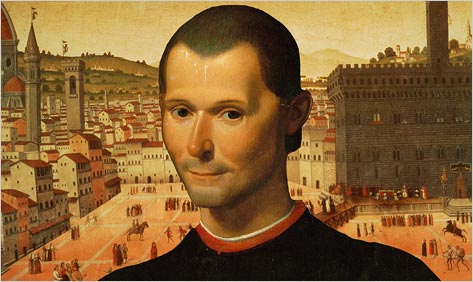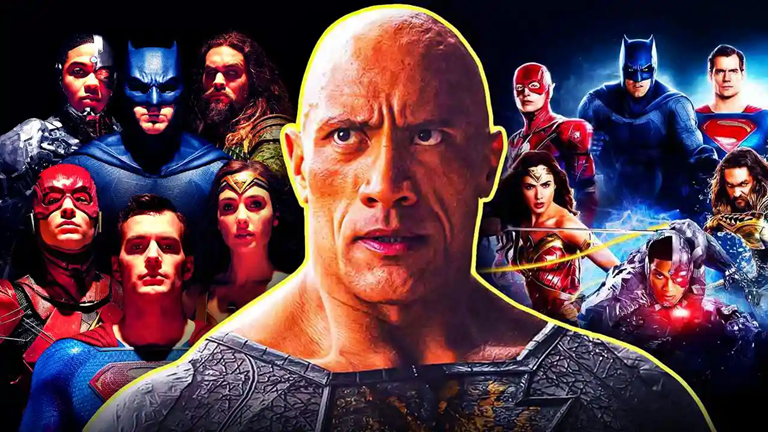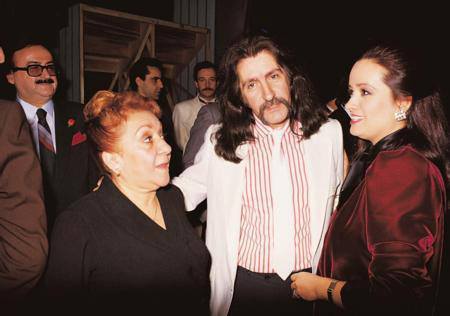Machiavelli’s ideas about power are very important. Because Machiavelli is different from other thinkers. Because he is truly modern thinker, even he lived between 1469-1527. Politics is the realm of appearances, the place for making up ideas and identities, the theatre of dissimulation, where truth is subjected to power and power is mingled with lies. Machiavelli is the master-mind of the political game. Until Nicolo Machiavelli, writers about politics had been concerned primarily about how government should work. Machiavelli was concerned about how it actually does work.. The troubling aspect of his writings are their cold-heartedness. Machiavelli is just as willing to help the wicked maintain and expand their power as he is the virtuous.
According to Machiavelli, all men are bad. So there must be a person who has power. The person is so strong that he rules the people. The person is so wise that he assumes all men are bad. Nobody wants people to do bad things. Nobody wants people to lie, to cheat. However, he didn’t think about something. How does he know all men are bad? How does he know the wise ruler; the person who has power is good? Yes, he mentioned that despote is not good. However, I think if there is just one person who is Prince or something, who is the strongest, it is too bad. The strongest person, the wise ruler can do bad things to innocent people by force. I don’t mean there mustn’t be powerful people. I just don’t think that there must be just one powerful person. Because he/she can use his/her power for bad things. Machiavelli took this embarrassment to heart and later wrote powerfully about the political necessity of military strength, the dangers of procrastination, the folly of appearing irresolute, and the need for boldness, ferocity, and tangible power. Machiavelli had learned that truly effective leadership required taming fortune and empowering oneself to be the master of one’s own destiny.
I know that Machiavelli sees authority, power, and legitimacy as one and the same. What is important for Machiavelli is how these are used to reach one’s goals. All of these can manifest themselves in different ways depending on the type of intitution at hand. A monacrh, for example, will deal with these three differently than a republic would. In order to hold power a prince must either use power of authority, depending on what his objectives are. In either case he will legitimze his rule by the actions he choses. Remember, authority and power are not one and the same. For Machiavelli, these terms in and of themselves mean nothing. It is how they are used to reach the ends that is important. The pope’s sheer audacity and authority and most importantly the absolute nature of his power gave great hope for unexpected victory. Machiavelli focuses on attaining power, security, and honor. Though the path to this position of control, constancy, and credibility is filled with obstacles and dangers, leaders “must overcome them with virtue”.
For Machiavelli, human nature dictates political reality and necessity. What Machiavelli views as “necessary” in any given situation turns out to be the means to political stability and power. Since men are naturally evil, effective governance often requires harsh measures. By equating virtue and power, and justifying cruelty as a necessary means to political stability and power, Machiavelli establishes a new system of morality. Actions and intentions are no longer inherently good or bad, but are judged according to their usefulness in attaining certain ends. Machiavelli seeks to redefine what we ought to consider acceptable.
In The Prince, Machiavelli offered a monarchical ruler advice designed to keep that ruler in power. He recommended policies that would discourage mass political activism, and channel subjects’ energies into private pursuits. Machiavelli wanted to persuade the monarch that he could best preserve his power by the judicious use of violence, by respecting private property and the traditions of his subjects, and by promoting material prosperity. Machiavelli held that political life cannot be governed by a single set of moral or religious absolutes, and that the monarch may sometimes be excused for performing acts of violence and deception that would be ethically indefensible in private life. Maybe, I am too much humanist, but I think using violence is one of the worst things in the world.
“Good laws come from good arms”… That’s what Machiavelli thinks. He means weapons and armies by saying “arms”. I agree with Machiavelli. I don’t mean army must make rules, but I think powerful armies are good for enemies. War is a bad thing, of course. We mustn’t use power to make war. However, we must be powerful, because we have to protect ourselves.
I agree with History of Political Thought researchers. Machiavelli was the first modern thinker, maybe. Because before Machiavelli, thinkers were too much religious. Religion is not a bad thing, of course. It is good for people. However, according to me, in the world there mustn’t power of religion. Most people believe in God or other religious things. Most people believe in paradise and hell. So, people don’t want to do bad things to go to the paradise; not the hell. However, religion’s power can’t be in the society. Because some people can use it and unfortunately some people still use the power of religion. Religion mustn’t be used. We mustn’t think religious about power and other things even we believe in God or other religious things. We must think modernly. So the first modern thinker was Machiavelli, because he wasn’t too much religious. Religion is inside our hearts, but power is a serious problem. For example, these days money has got power. It is too bad for people, especially poor people.
It seems that Machiavelli really had no political commitments or political stripe: he seems to have been on nobody’s side politically. For when the Medici came to power, he began to work overtime to get in good with them. It seems that either he was ruthlessly ambitious or believed in serving in government no matter what political group or party was in charge. The Medici, however, never fully trusted him since he had been an important official in the Republic. They imprisoned and tortured him in 1513 and eventually banished him to his country estate at San Casciano (all this torture and imprisonment, however, didn’t stop him from trying to get in good with the Medicis). It was during his exile in San Casciano, when he was desparate to get back into government, that he wrote his principle works: the Discourse on Livy , The Prince , The History of Florence , and two plays. Many of these works, such as The Prince , were written for the express purpose of getting a job in the Medici government. He thinks that once you take over such a country and you kill the Prince and his family, it is easy to rule: there is no one with power to fear. Yes, I agree that people can do bad things like that to get power, too. However, who knows that he/she won’t live the same things? Maybe another person will come and kill you and your family. It is too bad, isn’t it? These days, you can’t do such things, otherwise you will be punished.
Even if you have a strong army you still need the goodwill of the people to keep a principality. It is easy to lose a new principality because a new prince can not immediately reward those that helped him. As soon as a principality is won, you should get rid of the rebels and strengthen yourself in your weakest places.
According to Machiavelli, armed men just consume the states income. Colonies are the best option. A prince should be careful that a foreigner does not come and get more power than he has. Neighbouring states not taken over should not be allowed to become too powerful. The prince must remain the master of the whole country. If you do not do this, you will be taken over, or otherwise you will constantly have power struggle difficulties.
If you listen to Machiavelli, you should keep your weak and powerless friends secure and protected. They will then come to you for help. You should not weaken yourself, especially by helping other to become more powerful.
As I said before, In 1513, Niccolo Machiavelli wrote The Prince as a primer for young men of that starkly brutal era. At the core of every true prince, Machiavelli claimed, lay the wherewithal and the willingness to exercise power, preferably with ruthless cunning. A prince’s life was enriched by conscience-free conflict. To the winner went all the spoils.
While also concerned with power, in its broadest sense, Harriet Rubin’s The Princessa points the way to very different strategies to gain and maintain power. It begins with the premise that women, as a group, have historically been excluded from positions of power. In many cases, those individuals who have gained access are allowed in as tokens. Or they break through barriers using warlike tactics. Or they squirm in using a combination of compromise, cooperation, and negotiation. And they seem always to give so much more than they get. Well, not anymore! The Princessa also works from the assumption that a woman’s kind of power is very distinct from a man’s. A woman’s power is subtler, more nuanced. Instead of using conflict to annihilate, the princessa uses conflict to reshape alliances. Instead of competition, there is provocation. To a princessa, love is a kind of power and power is a kind of love.
Let there be no doubt–this book is not for the fainthearted. It is a book about conflict. A book about power–how to embrace it, use it, and gain what you want from it. No more compromise and negotiation. As Machiavelli warns, “For a woman to triumph, she cannot play by the rules of the game. They are not her rules, designed to enhance her strengths. She has to change the game.”
At every opportunity he watched great men to see how they kept and extended their power. In 1502 he was sent to Romagna as a representative to Cesare Borgia, whom he admired for his boldness, clever frauds and expert use of cruelty.
The fascinating thing about Machiavelli’s works — particularly The Prince and to a lesser degree his “Discourses” — are their clear-eyed examination of political power, how it is obtained, maintained and expanded. A reader of his works is bound to think, “Yes, I’ll bet that would work!”
The troubling aspect of his writings are their cold-heartedness. Machiavelli is just as willing to help the wicked maintain and expand their power as he is the virtuous.
For example, if you are not sure whether to rise to power by brute force or by deceit, Machiavelli will help you decide. It is the chapter in Discourses entitled, “Cunning and deceit will serve a man better than force to rise from a base condition to great fortune.”
Or, if you are having trouble deciding whether to kill the people from whom you have taken political power, Machiavelli would recommend you read the chapter in Discourses titled, “A prince cannot live securely in a state so long as those live whom he has deprived of it.”
During the Renaissance there was an effort to divorce learning from religion and religiously-derived morality, and Machiavelli — a man of his time — was simply applying this logic to the study of power.
Machiavelli’s skillful redefinition of principles represents a shift from the classical notion of virtue taught by religion to a system of self-interest justified by secularism. In this conception, ideals are judged according to their utility. Indeed, in his acceptance of all effectual means to political power, Machiavelli grants a certain kind of approval for what were previously held to be evil acts. It is for this reason that Machiavelli is perhaps the most famous as well as the most infamous of political philosophers.
Nevertheless, it is troubling to think that such tyrants as Hitler, Lenin, and Mussolini have found Machiavelli such valuable reading. They say that rapper Tupac Shakur’s favourite thinker was Machiavelli. It seems that Machiavelli’s ideas affected world history. However, I think thinkers should teach the world peace more than power, authority, etc. Because when all people use power, there can be chaos, war. I don’t mean we must obey the people who has got power but the most important thing who should have power is peace…
TURGAY SUAT TARCAN
0003020018
SOURCES:
http://www.tst.gen.tr
http://www.readinggroupguides.com/guides/princessa_machiavelli_for_women.asp
http://www.bdp.it/~geir0001/aulabit/rosselli/italiano/rfimachi.html
http://www.wsu.edu:8080/~dee/REN/MACHIAV.HTM
http://www.lucidcafe.com/library/96may/machiavelli.html
http://www.wesleyan.edu/course/fist238f.htm
http://www.gradesaver.com/ClassicNotes/Authors/about_niccolo_machiavelli.html
Christopher Romford’s lessons
Article Categories:
English · Ödevler
Likes:
0 







